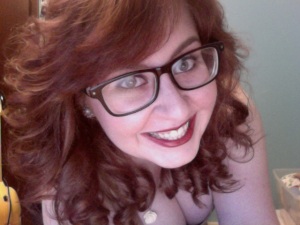~~
I have a popular post on my personal blog that’s part of a series I did called How I Got My Agent. I thought I’d take out the “good bits” from Part 1, and share them with you here.
Much like in the How to Write a 1-page Synopsis, I’ve drawn up a “worksheet” that you can use to format and write your novel’s query letter.
And if you’re interested in reading about WHY my query worked from my agent’s point of view, you can read about it on the NCLit blog.
~~~
The Query
I started querying on October 6, 2010. But before that, I spent a loooooooong time honing my query letter. Like, I took workshops, read books, and got feedback until my eyes bled.
But it all paid off! Out of the 12 agents I queried, 9 requested a full or partial manuscript. WEEEEE, right? (Note: part of my success rate has to do with my research, but I’ll talk about that in Part 2: The Prep. Nonetheless, a good chunk of my success was thanks to my kick-booty query.)
The thing about query letters is that there is a general standard for what should be in a query and how it should be presented. Above all else, you must include a summary of your book — you must show your book’s plot. Next, you need to keep the query professional. This is a business letter — remember that!
A few other rules to keep in mind:
- Be brief, be brief, be brief! Your goal is to snag the agent’s attention immediately and only share enough information so they want to read more. Keep the story summary under 250 words.
- Do not tell the ending! The purpose of a query is to show an editor/agent that you can tell a story from beginning to end, but you want to leave the end unknown. This is much like the back of book – you want to sell your story and entice them to read more.
- You must lay out,
- the MC’s goal,
- why the MC is choosing to act,
- what’s at stake if the MC fails.
The Parts of a Good Query
Below, I have written out the building blocks of a strong query letter. I’ve filled the formula in with my own query, and I hope you find it useful!
Opening lines — Why are you contacting this agent/editor? What is the title, genre, and word count of your novel?
(I’ll get into this more tomorrow and explain why I suggest starting here.)
I read in an interview that you seek strong female leads as well as steampunk. As such, I thought you might enjoy my 90,000 word young adult novel, THE SPIRIT-HUNTERS.
Hook — What is a one sentence zinger that introduces the MC, sets up the stakes, and is (most importantly) concise?
After her brother is kidnapped, Eleanor Fitt – a sixteen-year-old with a weakness for buttered toast and Shakespeare quotes – must leave the confines of corsets and courtesy to get him back.
Summary Paragraph 1 — Briefly describe the ordinary life of the MC. Follow this with the inciting incident and why the MC must pursue it (i.e. what is at stake?).
It’s 1876, and Philadelphia is hosting the first American World Fair, the Centennial Exhibition. It’s also hosting rancid corpses that refuse to stay dead. When one of those decomposing bodies brings Eleanor a hostage note for her brother, she resolves to do anything to rescue him. But to face the armies of Dead that have him, she’ll need a little help from the Spirit-Hunters.
Summary Paragraphs 2 & 3 — List/show in 2-3 sentences what the MC must do to solve the problem before him/her. What choices must he/she make? Be sure to end these paragraph with a sentence explaining what will happen if he/she fails. You want to leave the agent with a perfectly clear idea of why this story matters.
The Spirit-Hunters, a three-man team hired to protect the Exhibition, have a single goal: return the Dead to their graves. Yet, what began as a handful of shambling bodies has escalated beyond the team’s abilities, and time is running out. Whoever rules the Dead is losing control, and when the leash finally snaps, Philadelphia will be overrun with ravenous corpses.
Now Eleanor must battle the walking Dead and deal with her growing attraction to the team’s inventor, Daniel, an exasperating but gorgeous ex-con. From the steampunk lab of the Spirit-Hunters to the grand halls of the Exhibition, Eleanor must follow the clues – and the bodies – to find her brother and stop the Dead before it’s too late.
Conclusion — List your qualifications as a writer (societies, publications) in one sentence. If you can, try to find 2 works similar to your own (this shows the agent what audience you believe will read your novel). Then thank the agent for his/her time. Sign off.
Though the novel has been written as a trilogy, it can stand alone. I believe it will appeal to fans of Libba Bray’s GEMMA DOYLE trilogy or Cassandra Clare’s CLOCKWORK ANGEL. I’m an active member of RWA, SCBWI, the Online Science Fiction and Fantasy Workshop, and YALitChat. I live in Germany and am working full-time on my next YA novels. You can learn more about me at http://susandennard.com.
So there you have it: a simple way to start building your query. Again, I hope you can use it. Be sure to read Part 2: The Prep — or all the preparations needed prior to actually mailing your queries.
BOTTOM LINE: A good query can do wonders and instantly pull you to the surface of the slush!
Do you have any tips to share?
~~~
Susan Dennard is a writer, reader, lover of animals, and eater of cookies. She is repped by Sara Kendall of NCLit, and her debut, The Spirit-Hunters, will be available from Harper Children’s in 2012. You can learn more about her writing process, crazy life-thoughts, and crippling cookie-addiction on her blog or twitter.

 by
by 

 So, the villain of my life’s movie has this theme song: “Space Dementia” by MUSE. It’s deliciously creepy and dark, but hauntingly lovely at the same. A truly tormented villain in my life’s movie. 🙂
So, the villain of my life’s movie has this theme song: “Space Dementia” by MUSE. It’s deliciously creepy and dark, but hauntingly lovely at the same. A truly tormented villain in my life’s movie. 🙂












 By Sarah J. Maas
By Sarah J. Maas

 LTWF Facebook
LTWF Facebook LTWF Twitter
LTWF Twitter